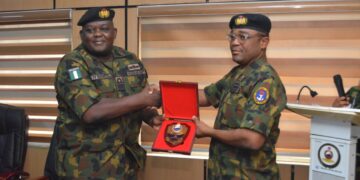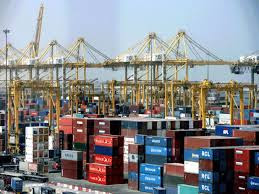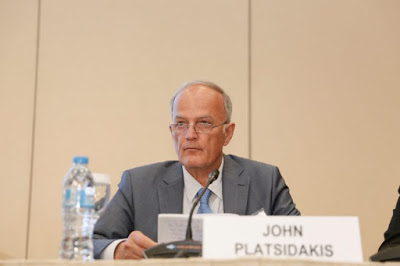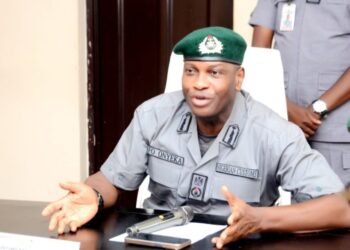Maritime Industry stakeholders will on June 13 converge
in Lagos to discuss the gains and challenges of the Executive Order on Ease of
Doing Business at the ports, as the order clocks one year.
in Lagos to discuss the gains and challenges of the Executive Order on Ease of
Doing Business at the ports, as the order clocks one year.
The event which is being
organised by Primetime Reporters to mark its 2nd Annual Lecture & Awards,
will take place at the Nigerian Institute of International Affairs (NIIA), Kofo
Abayomi Street, Victoria Island, Lagos at 9:00am.
The event themed “The Gains
and Challenges of Presidential Order on Ease of Doing Business in the Nigerian
Maritime Industry One Year After” will have the Honourable Minister of
Transportation, Rt. Hon. Chibuike Rotimi Amaechi as the Chief Guest of Honour,
while the Anambra State Commissioner for Road, Rail and Water Transport, Hon.
Prince Uchenna Charles Okafor will be the Special Guest of Honour.
and Challenges of Presidential Order on Ease of Doing Business in the Nigerian
Maritime Industry One Year After” will have the Honourable Minister of
Transportation, Rt. Hon. Chibuike Rotimi Amaechi as the Chief Guest of Honour,
while the Anambra State Commissioner for Road, Rail and Water Transport, Hon.
Prince Uchenna Charles Okafor will be the Special Guest of Honour.
The organisers of the event
said Dr. Eugene Nweke, former National President of the National Association of
Government Approved Freight Forwarders (NAGAFF), would serve as chairman of the
occasion, while the Director-General of the Lagos Chamber of Commerce and
Industry (LCCI), Mr. Muda Yusuf would deliver the theme paper for the day.
said Dr. Eugene Nweke, former National President of the National Association of
Government Approved Freight Forwarders (NAGAFF), would serve as chairman of the
occasion, while the Director-General of the Lagos Chamber of Commerce and
Industry (LCCI), Mr. Muda Yusuf would deliver the theme paper for the day.
Remarkably, the heads of
various government agencies in the maritime industry, leadership of various
associations and key stakeholders will take their turn to give their assessment
of the presidential order in the last one year.
various government agencies in the maritime industry, leadership of various
associations and key stakeholders will take their turn to give their assessment
of the presidential order in the last one year.
Speaking on the essence of
the lecture, the Managing Director/ Editor-in-Chief of Primetime Reporters, Mr.
Saint Augustine Nwadinamuo, recalled that the Vice President of Nigeria, Prof.
Yemi Osinbajo, at that time, Nigeria’s Acting President, on Thursday May 18,
2017 signed an executive order on transparency and improving the business
environment in Nigeria.
the lecture, the Managing Director/ Editor-in-Chief of Primetime Reporters, Mr.
Saint Augustine Nwadinamuo, recalled that the Vice President of Nigeria, Prof.
Yemi Osinbajo, at that time, Nigeria’s Acting President, on Thursday May 18,
2017 signed an executive order on transparency and improving the business
environment in Nigeria.
Nwadinamuo noted that the
executive order (EO1) which contained far-reaching measures with direct
benefits for Nigerian businesses as a proof of the federal government’s
commitment and determination to ease the business environment has five main
planks namely; transparency, default approvals, one government, entry
experience of travellers and visitors and ports operations.
executive order (EO1) which contained far-reaching measures with direct
benefits for Nigerian businesses as a proof of the federal government’s
commitment and determination to ease the business environment has five main
planks namely; transparency, default approvals, one government, entry
experience of travellers and visitors and ports operations.
“However, the lecture seeks
to dwell on the last plank which is the port operations. It is pertinent to
note here that ports operations as one of the main planks of the executive
order (EO1) has what I will call the six enablers on which the order is built
and is to be measured. They are as follows; 1. All agencies present at the
ports shall harmonize their operations into one single interface station in one
location in the port and implement by a single joint task force at all times.
2. The new single interface solution at the ports shall supply weekly data on
goods arriving and departing Nigeria to the head of the MDA and head of the
National Bureau of Statistics. 3. Each port in Nigeria shall assign an existing
port terminal to be dedicated to the export of agricultural produce. 4. The
Apapa port shall resume 24 hour operation within 30 day of the issuance of this
order. 5. No touting is allowed at the ports by official or nonofficial
persons. 6. Any official caught soliciting of receiving bribes from passengers
or other port users shall be subject to immediate removal from post and
disciplined.
to dwell on the last plank which is the port operations. It is pertinent to
note here that ports operations as one of the main planks of the executive
order (EO1) has what I will call the six enablers on which the order is built
and is to be measured. They are as follows; 1. All agencies present at the
ports shall harmonize their operations into one single interface station in one
location in the port and implement by a single joint task force at all times.
2. The new single interface solution at the ports shall supply weekly data on
goods arriving and departing Nigeria to the head of the MDA and head of the
National Bureau of Statistics. 3. Each port in Nigeria shall assign an existing
port terminal to be dedicated to the export of agricultural produce. 4. The
Apapa port shall resume 24 hour operation within 30 day of the issuance of this
order. 5. No touting is allowed at the ports by official or nonofficial
persons. 6. Any official caught soliciting of receiving bribes from passengers
or other port users shall be subject to immediate removal from post and
disciplined.
“While implementation deadline
for harmonization of operations was July 17, 2017, implementation deadline for
designation of export terminal for agricultural produce and the implementation
deadline for 24 hour operations at Apapa port was June 17, 2017. (Source: The
Nigerian Economic Summit Group).
for harmonization of operations was July 17, 2017, implementation deadline for
designation of export terminal for agricultural produce and the implementation
deadline for 24 hour operations at Apapa port was June 17, 2017. (Source: The
Nigerian Economic Summit Group).
“One year down the line,
there are divergent opinion on whether or not the executive order has actually
served its purpose in the industry and whether or not the industry has
benefited from it. Hence, as part of our constitutionally assigned duty as the
fourth estate of the realm and as part of our corporate social responsibility
(CSR), Primetime Reporters has chosen to bring this to the fore for an unbiased
and independent assessment of the order with the intent of fine-tuning it for a
better result.
there are divergent opinion on whether or not the executive order has actually
served its purpose in the industry and whether or not the industry has
benefited from it. Hence, as part of our constitutionally assigned duty as the
fourth estate of the realm and as part of our corporate social responsibility
(CSR), Primetime Reporters has chosen to bring this to the fore for an unbiased
and independent assessment of the order with the intent of fine-tuning it for a
better result.
“To get this done, we have
engaged the intellectual prowess of no less a person than the eminent
Director-General of the Lagos Chamber of Commerce and Industry (LCCI), Mr. Muda
Yusuf to do justice to the theme and I have no doubt that he will do justice to
the topic”, he said.
engaged the intellectual prowess of no less a person than the eminent
Director-General of the Lagos Chamber of Commerce and Industry (LCCI), Mr. Muda
Yusuf to do justice to the theme and I have no doubt that he will do justice to
the topic”, he said.
He further informed that the
organisation would in the course of the event honour fourteen (14) eminent
Nigerians who have distinguished themselves in their various fields with awards,
adding that while twelve (12) of them are from the maritime industry, two (2)
of them are not.
organisation would in the course of the event honour fourteen (14) eminent
Nigerians who have distinguished themselves in their various fields with awards,
adding that while twelve (12) of them are from the maritime industry, two (2)
of them are not.
He therefore invites all
maritime stakeholders, government agencies and private operators alike to the
event believing that there is no better way to spend the day than to be at the
lecture and be part of history in the making of the maritime industry in
Nigeria.
maritime stakeholders, government agencies and private operators alike to the
event believing that there is no better way to spend the day than to be at the
lecture and be part of history in the making of the maritime industry in
Nigeria.

































































